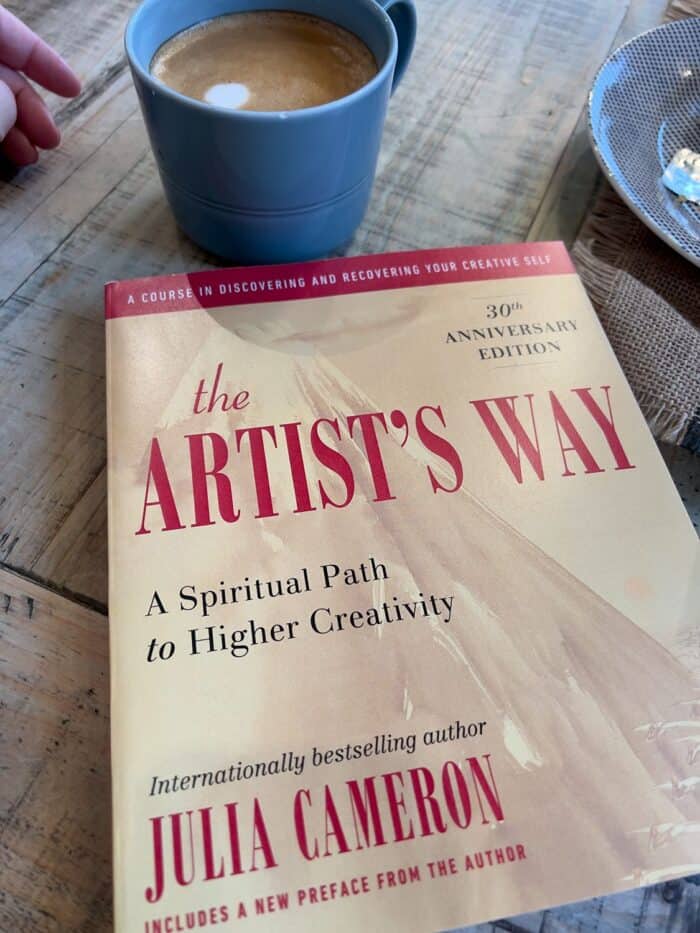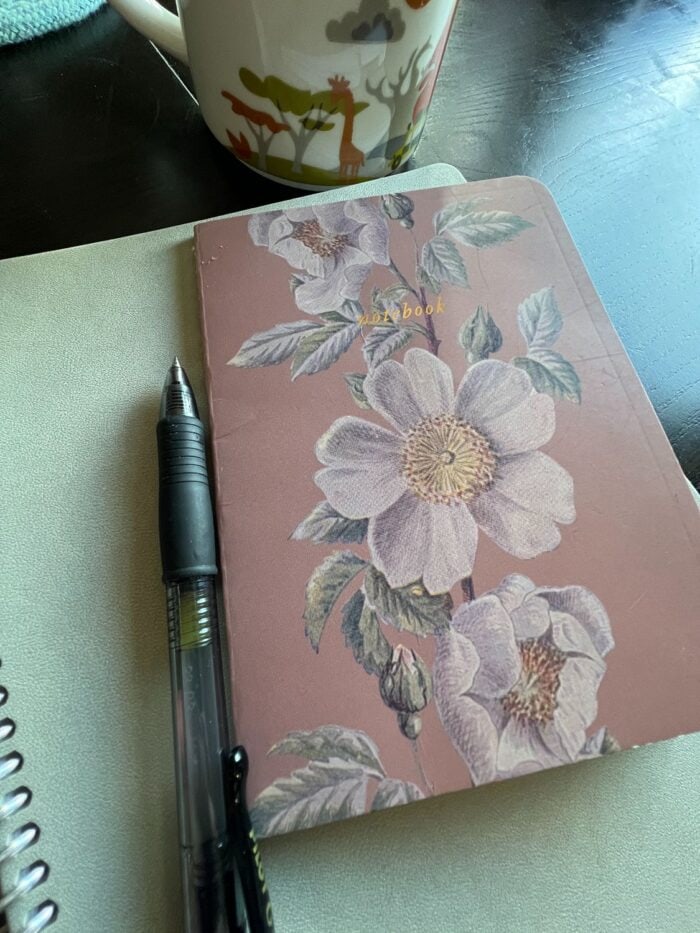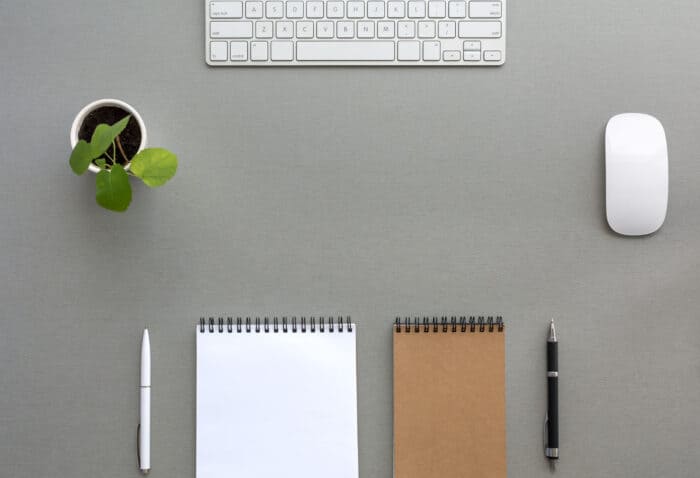As a busy mom, juggling countless responsibilities it’s easy to wake up and feel overwhelmed or anxious about my day. Adding the practice of writing daily Morning Pages has been a powerful game-changer that you should know about.
This isn’t just writing — it’s a powerful tool designed to clear your mind and set a positive tone for the day ahead. Continue reading below to learn what the practice of Morning Pages is and how it might help you become more productive, creative, and focused.

In this post, I’ll share how Morning Pages work, why it is different from a brain dump (which should not be abandoned), and why it’s perfect if you are busy. By taking just a few minutes each morning to write, you’ll reduce stress, boost creativity, and find clarity before starting your day. Let’s see how this simple habit can transform your days.
As an Amazon Associate and member of other affiliate programs, I earn a small commission from qualifying purchases when you click links in this post, at no cost to you.
Think of your mind as a static-filled radio. Morning Pages can act like a dial, helping you clear the static and find the signal. This practice can help you identify worries, clarify what’s important to you, and set a positive tone for your day. You don’t have to worry about grammar, punctuation, or making sense. Just let the words flow.
What Are Morning Pages?
“Morning Pages are three pages of longhand, stream-of-consciousness writing, done first thing in the morning.”
– Julia Cameron, The Artist’s Way
Don’t let this quote from the author scare you away… In this article, I’ll explain how I’ve adjusted this practice to create a more manageable daily habit that doesn’t require 3 whole pages of writing.
I stumbled upon the idea of morning pages in one of my favorite productivity books, Miracle Morning, by Hal Elrod. The concept however was first shared by Julia Cameron in her book, The Artist’s Way which I picked up in a bookstore in Providence, Rhode Island in 2022.
“Pages clarify our yearnings. They keep an eye on our goals. They may provoke us, coax us, comfort us, even cajole us, as well as prioritize and synchronize the day at hand. If we are drifting, the pages will point that out. They will point the way True North. Each morning, as we face the page, we meet ourselves. The pages give us a place to vent and a place to dream. They are intended for no eyes but our own.”
– Julia Cameron, The Artist’s Way

The Original Concept Behind Morning Pages
The Artist’s Way and Morning Pages
Julia Cameron introduced Morning Pages as a tool for unlocking creativity and productivity. In her book, she outlines how this daily writing ritual can help anyone, not just artists, tap into their creative potential.
She explains that Morning Pages act as a form of meditation. By pouring your thoughts onto paper, you lower the noise level in your mind. This makes room for new ideas and inspiration. I’ve found that this practice allows me to begin my days with a clean slate.
Since its introduction, the practice has earned a large following. People from all walks of life, including busy moms like me, have found it to be a powerful tool.
Writing Morning Pages might seem like adding another task to your already packed day, but think of it as an investment in your productivity and mental well-being. It’s a small commitment with a big payoff.
The Benefits of Morning Pages Journaling
Writing Morning Pages isn’t just about scribbling down random thoughts. This morning ritual has powerful benefits that can improve your entire day.
1. Clearing Mental Clutter
Think about how many thoughts run through your mind when you first wake up. It’s like a crowded attic filled with old stuff you don’t need anymore. Morning Pages help you clear out that mental clutter. By writing down your actual thoughts, questions, and ideas, you reduce anxiety and improve focus for the day ahead.
Imagine starting your day with a clean slate. When you write, you offload those nagging thoughts. You know, the ones about what to cook for dinner or that awkward conversation you had last week. Once they’re out of your head and on paper, you can approach your tasks with clarity and purpose.
2. Boosting Creativity and Problem-Solving
Have you ever had a fantastic idea pop into your head during a shower or while driving? That’s because your brain is free to wander. Morning Pages work the same way. They free up space in your mind, making room for creative thoughts and better problem-solving.
When you jot down your thoughts without any filters, you often stumble upon ideas you didn’t know you had. It’s like unlocking a treasure chest of creativity. Plus, writing about problems can lead to unexpected solutions.
3. Improving Emotional Well-being
While writing your Morning Pages you might notice that you are not only writing ideas and tasks that come to mind, but also writing feelings and emotions that pop up. Writing them down brings these emotions out of hiding. I like to think of it as taking something out of a cluttered space and setting it aside in a safe place to deal with it later or simply getting it out of the way!
You might think that you need to stop everything and deal with your emotions now… but that is not the purpose of Morning Pages. I like the way that Susan David explains her concept of this,
“… I encourage people to see their emotions as data, not directives. Think of them as one data point among many to consider as you move forward.”
“Processing those issues might take some intensive work, including therapy, but even just recognizing their influence can help guide you toward productive outcomes.”
– Susan David, Recognizing Your Emotions as Data, Not Directives
Writing about your feelings makes you see that these worries are truly interfering, and offers a safe space to acknowledge them.
This can help you navigate daily stresses more gracefully. For busy moms, this is priceless. Imagine facing the day with a sense of calm and control, no matter what comes your way.

It’s OK to Break the Rules
You might be asking yourself, “Why three pages and why in the morning, and is this crucial??“
Here is where I tell you it’s ok to break the rules!
I believe that it is more that you adjust this so you will do it, rather than follow rules because someone said that’s how it works best for them.
- You do not need to write 3 full pages.
- You do not have to do your Morning Pages exclusively in the morning.
You do Not Have to Write 3 Pages
Do you have to write 3 pages? No. Do you have to always write stream-of-consciousness, no. Do you have to do it first thing in the morning, no. Do you have to write longhand, full sentences, no.
I truly believe that morning pages will only work for you if you make them personal.
If you are an artist who likes to doodle, you may draw for the first few minutes and warm up to writing sentences. You may like to write a list of little thoughts instead of full sentences. You may prefer using a computer… do what works for you!
3 Pages?
For me, it doesn’t usually take 3 pages. Everyone will have a different opinion on this and you may land somewhere in the middle, but I try to write at least one side of a page or for at least 5 minutes.
Morning or Night?
While most people, myself included, prefer to do this in the morning some people really enjoy doing their “Morning” Pages before bed. I can see how it would be helpful to clear your mind before bed but I’ve found it more beneficial to do it before beginning my work for the day.
You get to choose what works best for you. Maybe try mornings for 3 days then try evenings for 3 days and note the differences. Were you more clear-headed, focused, productive, or calm?
Hand Written Pages
As a computer nerd and fast typer, I have to disagree with one opinion that Julia shared in her book:
“Pages must be done longhand. The computer is fast—too fast for our purposes. Writing by computer gets you speed but not depth. Writing by computer is like driving a car at 85 mph. Everything is a blur. “Oh, my God, was that my exit?” Writing by hand is like going 35 mph. “Oh, look, here comes my exit. And look, it has a Sonoco station and a convenience store.”
– Julia Cameron, The Artist’s Way
Sorry, but I politely disagree.
To make morning pages a regular practice, you need to find a way that works for you. As a digital creative, typing on my Macbook is comfortable and my hands can keep up with my fast-moving mind much better. Some mornings I still write in my physical Morning Pages Journal, other times I type in Notes. I tend to switch between the two.
Imagine starting your day without that mental fog hanging over you. With Morning Pages, you bring those hidden thoughts into the open. This allows you to approach your day with a clear, focused mindset.
Morning Pages vs. Brain Dump
For years I have encouraged people to do a daily Brain Dump. I even have a printable brain dump trigger list that you can download and print to help you. You may be wondering how writing these Morning Pages differs from doing a brain dump and it’s a fairly simple difference but it’s important to understand.
A brain dump is sometimes called a mind sweep. It is a way to get all of the thoughts, new ideas, and to-dos out of your mind by writing them all down each day (or week). Some keys that make a brain dump different from writing Morning Pages are:
- It is a rapid log – I usually only take about 2-3 minutes to do mine now.
- It is usually a list, not complete sentences like morning pages
- It is typically task-focused, so most items you write down will include a verb or description of what needs to be done. Morning pages are a stream-of-conscious practice where you write down your actual thoughts – word for word.
- The goal is to get distractions out of your mind so you can focus but the goal of Morning Pages is to get thoughts and emotions out of your mind in a safe judgment-free way. I feel like Morning Pages allows me to unload heavy emotions and brain dumping allows me to capture tasks and projects.
- My brain dumps tend to live in one notebook and they are like a continuous list that I can then use to create task lists. Morning pages don’t usually continue from day-to-day, I start a new page each morning and I do not continue thoughts from the day before.
I think both Morning Pages and Brain Dumps have an important role in productivity and it can be helpful to do both.
Tips for Starting Your Morning Pages Practice
Adding a Morning Pages practice or habit can be a game-changer. You do not need much to get started if you are already in the habit of doing a morning routine. If you don’t have a morning routine habit you might want to read this article first: How to Create Your Perfect Morning Routine, then come back here when you’re ready to add the Morning Pages practice.

Choose Your Tools
Picking the right tools can make a big difference. You don’t need anything fancy, but having a setup you like will encourage you to stick with it.
- Notebook: Choose a notebook that feels comfortable to write in. Some people prefer a simple spiral notebook, while others might go for a more luxurious journal.
- Pen: Use a pen that glides smoothly on paper. It’s worth investing in one you enjoy writing with.
- Digital Options: If you prefer typing, consider using a digital app. There are plenty of journaling apps available that can keep your entries secure and organized. You may want to type on a laptop, desktop, or smaller iPad or tablet.
By selecting tools that you already love you make the process of writing Morning Pages a bit more enjoyable.
What about Privacy?
One of the major concerns with journaling is privacy. You might wonder what would happen if someone else read your Morning Pages. Here are some tips to maintain your privacy:
- Find a Safe Spot: Keep your journal in a place where only you have access, like a locked drawer or a personal bag.
- Throw it away after: You do not even need to keep your Morning Pages and many people throw away their page after they are done.
- Digital Lock: If you prefer digital journaling, use apps that offer password protection.
Be Kind to Yourself
Starting a new habit can be challenging, and it’s important to be patient with yourself.
- Avoid Perfectionism: Your Morning Pages don’t have to be perfect. In fact, they shouldn’t be. Remember that no one else will be reading it and It’s about the process, not the product.
- Forgive Missed Days: If you miss a day, don’t beat yourself up. Just get back on track the next day.
Tips Steps to Consider:
- Wake Up Earlier: Set your alarm 15-30 minutes earlier. This small change gives you a quiet window to focus on your Morning Pages without interruptions.
- Create a Comfortable Space: Find a peaceful spot in your home. Whether it’s your kitchen table or a cozy nook, make sure it’s a place where you can relax and write freely.
- Prepare the Night Before: Lay out your journal and a pen before going to bed. This way, you can dive right in as soon as you wake up without any delay.
- Make it Routine: Tie your Morning Pages to another morning habit. For instance, write right after you brush your teeth or have your first cup of coffee.
Incorporating Morning Pages into your morning routine can seem daunting at first, but with a bit of planning and dedication, it can become a rewarding and essential part of your day.
Will You Try Doing Daily Morning Pages?
Morning Pages can be a meaningful addition to your daily routine. Writing for just a few minutes each morning can provide a sense of calm and control in the midst of a busy schedule.


Leave a Reply